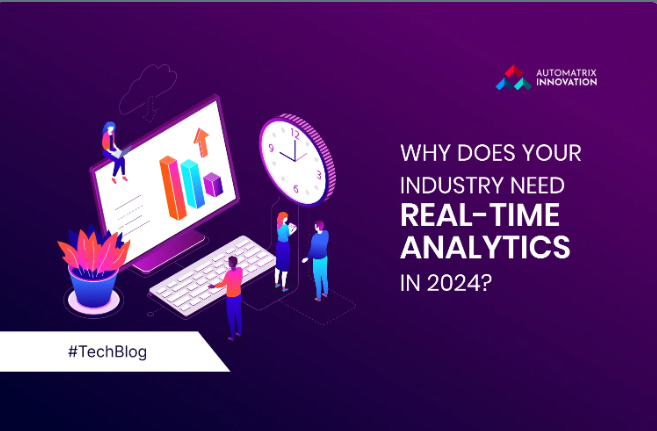Data AnalyticsWhy Does Your Industry Need Real-Time Analytics in 2024?
23 December 2024

In today’s rapidly evolving business landscape, where time is a critical factor and information is abundant, Real-Time Data Analytics has become indispensable for maintaining a competitive edge. Utilizing Real-time Analytics allows businesses to gain timely insights into customer behavior, market trends, and operational efficiency.
Imagine data flowing smoothly, like a well-conducted orchestra. Real-time Analytics acts as the conductor, extracting valuable insights from diverse data streams. It’s akin to having a predictive tool that enables businesses to optimize, anticipate, and capitalize on opportunities as they arise.
Gone are the days when businesses had to rely solely on hindsight for critical decisions. Real-time analytics offers a clear snapshot of the present, empowering companies to make informed, agile decisions that can significantly impact business outcomes.
Understanding Real-Time Analytics
Real-time Analytics is the process of gathering, processing, and analyzing data as it is generated. Think of it as having a digital assistant that continuously monitors every aspect of your operations—from production lines to supply chains—and provides immediate feedback. Unlike Traditional Analytics, which often depends on historical data and can take time to produce reports, Real-time Analytics offers instantaneous insights. This allows industries to react to challenges and opportunities as they occur, leading to smarter, faster decision-making.
The Importance of Real-Time Analytics Across Industries
1.Enhances Operational Efficiency: Efficiency is crucial for profitability in any industry. Real-time Analytics enables companies to monitor the performance of machinery, systems, and personnel in real-time. For example, if a machine is underperforming or if there’s a bottleneck in the production process, managers are immediately notified. This instant feedback allows for quick corrective actions, reducing downtime and ensuring that operations run smoothly without unnecessary interruptions.
2.Reduces Waste and Costs: Waste, whether in raw materials, energy, time, or labor, can significantly affect profitability. Real-time Analytics helps industries identify wasteful practices as they happen. For instance, if sensors detect that a machine is consuming more energy than usual, or if material usage is unexpectedly high, the system flags these anomalies. Addressing these issues in real-time allows industries to reduce waste, optimize resources, and ultimately lower operational costs. Additionally, operating more efficiently contributes to sustainability, which is increasingly important in today’s eco-conscious world.
3.Improves Quality Control: Quality is a non-negotiable factor in any industry. Real-time analytics enables companies to monitor product or service quality at every stage of development. In a manufacturing setting, for example, sensors can track material quality and machinery precision, ensuring that each product meets the required standards. If a defect is detected, the system can halt production or redirect the defective batch, preventing flawed products from reaching the market. This proactive approach saves costs associated with recalls or rework and helps maintain a company’s reputation for quality and reliability.
4.Optimizes Supply Chain Management: The supply chain is the backbone of many industries, and its efficiency is crucial for business success. Real-time Analytics offers a comprehensive view of the supply chain, from inventory levels to supplier performance and delivery schedules. By tracking these elements in real-time, industries can ensure materials arrive just in time, reducing the need for large inventories and minimizing the risk of stockouts. Additionally, if a disruption occurs, such as a supplier delay, companies can quickly adjust their plans, find alternative sources, or reallocate resources to mitigate the impact.
5.Supports Predictive Maintenance: Equipment failure can lead to significant downtime and expensive repairs. Real-time Analytics is vital in predictive maintenance by continuously monitoring machinery's health and performance. Sensors can detect early signs of wear and tear, such as unusual vibrations, temperature changes, or noise levels. This data allows industries to schedule maintenance before a breakdown occurs, reducing unexpected downtime and extending equipment lifespan. This proactive maintenance approach helps optimize production schedules and reduce maintenance costs.
6.Enables Better Decision-Making: In today’s fast-paced business environment, having the right information at the right time is essential. Real-time Analytics equips managers with the data they need to make informed decisions quickly. Whether adjusting production schedules to meet sudden changes in demand, reallocating resources in response to a supply chain disruption, or identifying emerging trends, real-time insights enable companies to remain agile and responsive. This ability to adapt quickly can be a significant competitive advantage, allowing businesses to seize opportunities and avoid potential pitfalls.
7.Enhances Customer Satisfaction: Ultimately, the goal of any industry is to satisfy its customers. Real-time analytics plays a crucial role in understanding customer needs and behaviors. Real-time data can reveal patterns in customer orders, preferences, and feedback, allowing companies to tailor their offerings and improve service delivery. By responding swiftly to customer demands and maintaining high-quality standards, industries can build stronger relationships with their clients, leading to increased loyalty and long-term success.
Why Your Business Needs Real-Time Analytics in 2024
In 2024, Real-time Analytics is critical for industries as it enables faster and more intelligent decision-making. By analyzing data as it is generated, companies can quickly identify trends, resolve issues, and enhance their operations. This leads to improved efficiency, cost savings, and a competitive advantage. Whether monitoring equipment performance or tracking customer behavior, Real-time Analytics ensures that you stay ahead and can adapt swiftly to any changes.
Real-time Analytics is more than just a technological innovation—it is a strategic asset that can revolutionize how industries operate. By providing immediate insights into every aspect of business operations, real-time analytics empowers companies to enhance efficiency, reduce waste, improve quality, and make better decisions. In a world where every second counts, the ability to act on real-time data is a game-changer that can help industries stay competitive, agile, and responsive to both challenges and opportunities. By embracing real-time analytics, industries can not only enhance their business operations but also position themselves for sustained success in an ever-evolving marketplace.
